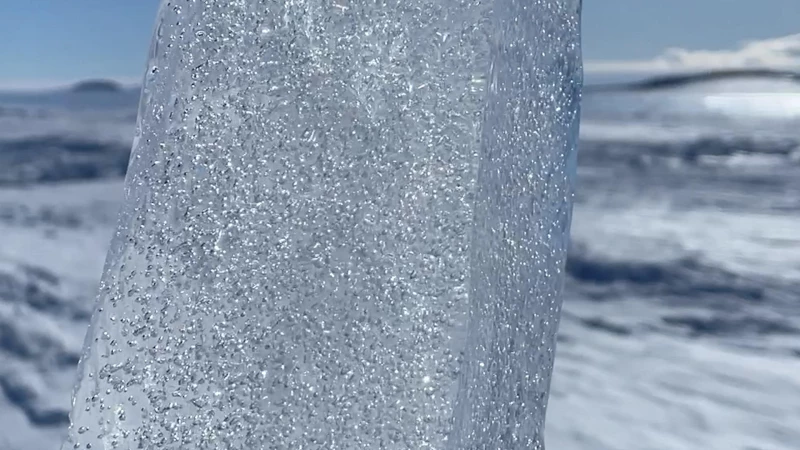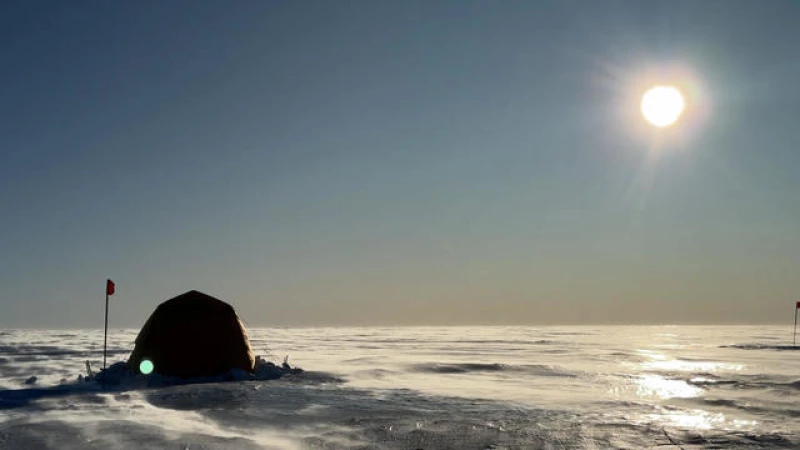Scientists in Antarctica Search for Oldest Ice Samples
Braving the harshest conditions on Earth, scientists from the United States are currently on an expedition in Antarctica in search of the oldest ice ever discovered. This groundbreaking endeavor aims to provide valuable insights into climate change and its effects.
The expedition is part of COLDEX, a federally funded collaboration between American universities and science organizations. The team of researchers has set up camp on the ice near the South Pole, enduring seven weeks without modern amenities such as showers or flushing toilets.
Once the ice samples are collected, they will be transported back to the United States for analysis. Scientists will examine the samples to gain a better understanding of the climate conditions that existed hundreds of thousands of years ago.
"The study of ice has provided us with a clear understanding of the impact humans are having on the Earth," said Ed Brook, the director of COLDEX.
Air bubbles in ice trap greenhouse gasses
As snow falls it traps in tiny air bubbles from the day it fell. The snow in Antarctica never melts because it's so cold. Ice builds up, layer upon layer, with all those air bubbles inside. Scientists then measure the levels of greenhouse gasses trapped inside those bubbles. That allows them to reconstruct how the climate changed in the distant past.
"The information that we get, particularly from ice cores, is just so critical to our bedrock understanding of how Earth's climate works," Peter Neff, field research director for COLDEX, said.
The oldest existing ice core goes back 800,000 years. Scientists analyzed the ice cores over time, and they show that the amount of carbon dioxide, which is the big driver of climate change, goes up and down.
The level skyrocketed after the Industrial Revolution, then continued to get higher every year, which further warms our planet.
The goal of COLDEX
COLDEX is funded by the National Science Foundation, which is the primary source of scientific research grants in the United States. The goal is to extend the continuous ice core record beyond 800,000 years ago to 1.5 million years ago, or even further, when the Earth was even warmer than it is now due to higher levels of greenhouse gasses in the atmosphere.
"We don't claim that by going back in time we're necessarily going to see something exactly like what we're seeing now," Brook said. "What we're looking for are all the different ways the system can behave when it's warmer."
Scientists are embarking on a challenging mission to locate a specific spot on a massive continent that contains 1.5 million years of perfectly preserved ice layers. The project, known as COLDEX, is expected to take several years to complete.

Research in U.S. labs
Once the ice is identified, researchers will use drilling techniques to extract core samples from the surface. To ensure the ice remains intact during transportation, climate-controlled packaging will be used. The first destination for the ice cores will be the National Science Foundation Ice Core Facility in Colorado, USA.
If the mission is successful, the ice cores will be transported to university labs, including Princeton University, where field researcher Sarah Shackleton from the COLDEX team is based. Shackleton expressed her fascination with the concept of studying ice that was once part of the atmosphere millions of years ago and is now being analyzed in New Jersey.
A global effort
American scientists are not the only ones involved in the search for the oldest ice. Teams from various other countries are also conducting their own missions in Antarctica with the same objective. European and Australian teams are drilling in different regions of the continent.
The team that successfully discovers the oldest ice is expected to receive significant international recognition for their groundbreaking work.







